Your Cart is Empty
Free Shipping over $50!

A popular T-shirt of returned Peace Corps volunteers says “Some see the glass half full, others half empty. A PCV sees a shower.” It’s safe to say this unusual outlook on the world helps explain why RPCVs are often drawn to Fair Trade. You might not be able to pick them out at the Fair Trade Federation conference because of their Birkenstocks and bad haircuts, but the desire to help people in the country where they served and others who are challenged with poverty stays with them for a lifetime and fits amazingly well with the Fair Trade principles. So in advance of Peace Corps Week (February 28th-March 5th), I want to take this opportunity to introduce you to some of the FTF members who served as Peace Corps volunteers and took the path often traveled into the world of Fair Trade.
Peace Corps started in 1962 and Bob and Sue Chase, joined as a young married couple right after college in 1968, during an incredibly turbulent time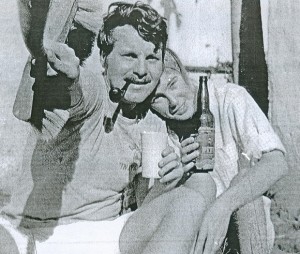 in US history including the assassinations of Martin Luther King Jr. and Robert Kennedy. Bob is the CEO of SERRV Internationaland Sue has worked for SERRV in many capacities. Early in his SERRV career, Bob attended the NAATO (North American Alternative Trade Organization) conference, the predecessor of the Fair Trade Federation.
in US history including the assassinations of Martin Luther King Jr. and Robert Kennedy. Bob is the CEO of SERRV Internationaland Sue has worked for SERRV in many capacities. Early in his SERRV career, Bob attended the NAATO (North American Alternative Trade Organization) conference, the predecessor of the Fair Trade Federation.
With Peace Corps’ still trying to define itself and its programs in the 1960’s, young people were often unprepared for the political environment in which they were immersed. “As we struggled to be ‘useful’…we became increasingly aware of how problematic it is for people from the Global North to impact poverty in developing nations with traditional development approaches,” Bob said. “Without a doubt, the exposure we had during our Peace Corps tour to the struggles of so many people in the developing world framed our world view and life goals,” Bob said. “It also convinced us that we could have a greater impact on the lives of struggling people if we could help to provide them with training, employment, and empowerment support.”
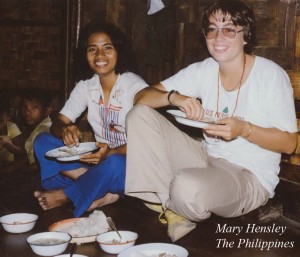 Mary Hensley was a volunteer in the Philippines in 1976 through 1978. Twenty-seven years after her service, she returned to the village where she lived with a feasibility study and a business plan for a Fair Trade partnership to turn their heirloom varieties rice, a crop that everyone in this remote mountainous region still grows, into a regional economic engine for the farmers. The Cordillera Heirloom Rice Project, with FTF member Eighth Wonder Inc. as its US-based marketing partner, now works in over a dozen municipalities across 3 provinces. The Rice Terraces Farmers Cooperative, which the project helped found, now has four processing facilities for heirloom rice and villages processing machines throughout the Cordillera. In 2015 the organization will be processing its 10th harvest for local and international sales.
Mary Hensley was a volunteer in the Philippines in 1976 through 1978. Twenty-seven years after her service, she returned to the village where she lived with a feasibility study and a business plan for a Fair Trade partnership to turn their heirloom varieties rice, a crop that everyone in this remote mountainous region still grows, into a regional economic engine for the farmers. The Cordillera Heirloom Rice Project, with FTF member Eighth Wonder Inc. as its US-based marketing partner, now works in over a dozen municipalities across 3 provinces. The Rice Terraces Farmers Cooperative, which the project helped found, now has four processing facilities for heirloom rice and villages processing machines throughout the Cordillera. In 2015 the organization will be processing its 10th harvest for local and international sales.
“I had the credibility to walk into the village with such an audacious plan,” Mary said, “because I had been a Peace Corps volunteer and I had returned.”
Mary Joan Ferrara set off for Botswana in 1989 to run a weaving workshop for people with disabilities. She has worked with the Guatemalan artisans 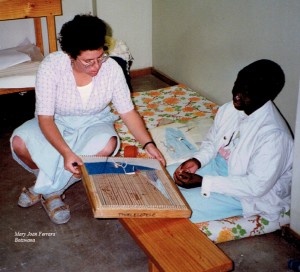 of UPAVIM, one of the founding member organizations of the FTF, since 1998.
of UPAVIM, one of the founding member organizations of the FTF, since 1998.
“It wasn’t until I started working in my current position that I realized that everything I did in running my workshop was following fair trade principles and it was my life’s work,” Mary Joan said. “It was so instinctual to me for [the Botswana weaving workshop] Twelelopele to follow the core principles of fair trade. The artisans got a fair wage for their work in a safe and fair working environment. It was very satisfying to help these people with disabilities become so empowered by their ability to help their families buy food and supplies and be productive members of their communities.”
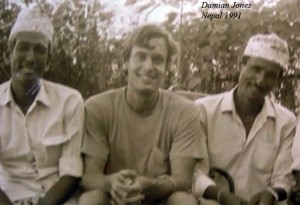 While in the Peace Corps, Damian Jones became inspired by the artisans of the Kathmandu Valley and throughout the country. He also had always been intrigued by the use of glass beads in the Nepalese culture. Upon his return to the United States, Damian began to conceive the idea of working with artisans in a fair, dignified manner as a way to improve their lives. In 1993 and 1994 he took three trips back to Nepal to actualize his vision of “fair trade” as a path to sustainable economic and personal development for artisans.
While in the Peace Corps, Damian Jones became inspired by the artisans of the Kathmandu Valley and throughout the country. He also had always been intrigued by the use of glass beads in the Nepalese culture. Upon his return to the United States, Damian began to conceive the idea of working with artisans in a fair, dignified manner as a way to improve their lives. In 1993 and 1994 he took three trips back to Nepal to actualize his vision of “fair trade” as a path to sustainable economic and personal development for artisans.
“Though I worked in education [while in Peace Corps], I also saw firsthand the giant impact micro-enterprise made in the status of women and the lives of their children.” Damian said. “In a sense, putting together the observation of a corrupted, broken foreign aid system and the observation of the big effect of micro-enterprise, I came up with concept for Aid Through Trade.” In 1993, Damian began marketing in the US, joining NAATO in 1994 and becoming one of the founding members of the FTF.
Like many PCVs, David Goldman of Atacora, found the spirit of service in high school that continued through his service i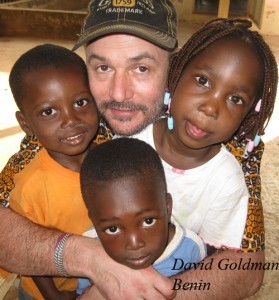 n Benin in 1992. Earning a Master’s degree at 40, he “hightailed it back to Benin very well armed to co-create a market based project with some of the superstars I already knew there,” David said. “Decades of aid-based development had left traces and improvements, but people were as poor as ever. We figured that revaluing human and botanical resources by opening global and local markets would put money in peoples’ hands, and that they knew how they wanted to advance their own futures perfectly well: having access to health care, educating their children and eating well.” Atacora was started in 2010.
n Benin in 1992. Earning a Master’s degree at 40, he “hightailed it back to Benin very well armed to co-create a market based project with some of the superstars I already knew there,” David said. “Decades of aid-based development had left traces and improvements, but people were as poor as ever. We figured that revaluing human and botanical resources by opening global and local markets would put money in peoples’ hands, and that they knew how they wanted to advance their own futures perfectly well: having access to health care, educating their children and eating well.” Atacora was started in 2010.
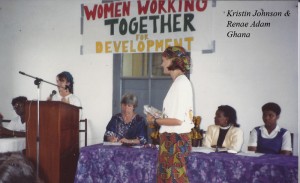 Kristin Johnson and Renae Adam went to Peace Corps after college graduation in 1993. The unlikely pair of volunteers fell in love with Ghana and the women that were their Peace Corps counterparts and started Global Mamasin 2003, with Renae returning to Ghana and Kristin setting up operations in the US. Their story is the quintessential PCV-to-FTF member story that culminated in the pair receiving the Sargent Shriver Award for Distinguished Humanitarian Service from the National Peace Corps Association in 2014.
Kristin Johnson and Renae Adam went to Peace Corps after college graduation in 1993. The unlikely pair of volunteers fell in love with Ghana and the women that were their Peace Corps counterparts and started Global Mamasin 2003, with Renae returning to Ghana and Kristin setting up operations in the US. Their story is the quintessential PCV-to-FTF member story that culminated in the pair receiving the Sargent Shriver Award for Distinguished Humanitarian Service from the National Peace Corps Association in 2014.
“The women of Ghana inspire us every day,” Kristin said. “Looking back over 20 years now and imagining ourselves moving to Africa as Peace Corps volunteers hoping to make a difference, we are instead so grateful for what we gained.”
“If it hadn’t been for my Peace Corps experience, I would have never been hired into the initial position when I joined Ten Thousand Villages8 years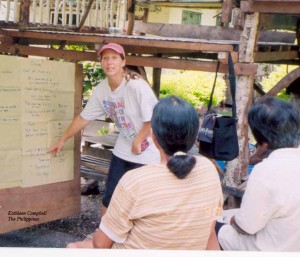 ago, Kathleen Campbell, Villages purchasing director said of her PCV service in 2006. “Beyond that, yes, the experience of working in fishing villages for 2 years made it impossible to go on in my career ignoring the inequities of the global economic regime. In the Peace Corps, you live and work with individuals, families, communities and the ecosystems that have little power in the context of the global economy. That experience of humanizing the consequences of North America’s wealth and relative power, creates an imperative to find a way to at least do a little less harm and perhaps to be a small part of the solution.”
ago, Kathleen Campbell, Villages purchasing director said of her PCV service in 2006. “Beyond that, yes, the experience of working in fishing villages for 2 years made it impossible to go on in my career ignoring the inequities of the global economic regime. In the Peace Corps, you live and work with individuals, families, communities and the ecosystems that have little power in the context of the global economy. That experience of humanizing the consequences of North America’s wealth and relative power, creates an imperative to find a way to at least do a little less harm and perhaps to be a small part of the solution.”
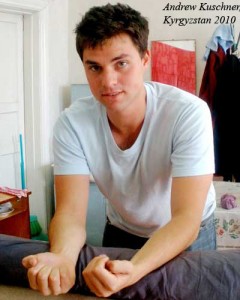 Andrew Kuschner’s first PC assignment in 2010 in Kyrgyzstan was as a TESL teacher. But as he became immersed in the culture he changed focus to the Small Enterprise Development sector because he saw the need of sustainable income and the amazing skills of the Kyrgyz artisans, particularly those working with felt. Serendipitously, the Smithsonian Folklife Festival invited eight PCVs and their counterparts to demonstrate and sell crafts celebrating the 50th Anniversary of Peace Corps. Not only was the event amazingly successful, it enabled Andrew to see that there was a market for the products. He started Silk Road Bazaarafter his PC service.
Andrew Kuschner’s first PC assignment in 2010 in Kyrgyzstan was as a TESL teacher. But as he became immersed in the culture he changed focus to the Small Enterprise Development sector because he saw the need of sustainable income and the amazing skills of the Kyrgyz artisans, particularly those working with felt. Serendipitously, the Smithsonian Folklife Festival invited eight PCVs and their counterparts to demonstrate and sell crafts celebrating the 50th Anniversary of Peace Corps. Not only was the event amazingly successful, it enabled Andrew to see that there was a market for the products. He started Silk Road Bazaarafter his PC service.
“Kyrgyzstan doesn’t have a very developed handmade business sector, English language skills are almost non-existent, the red tape of politics is long, and there are many cultural differences,” Andrew said. “ I attribute a lot of the success of the business to the fact that Peace Corps afforded me the time to integrate with the people and get to work with them in a very profound and deep way.”
“I became interested in Fair Trade after experiencing firsthand how my talented and motivated neighbors in the village very often had no way out of the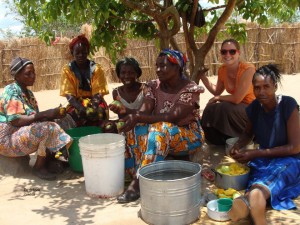 cycle of poverty in which they were trapped,” Val Schade the Social Media & Digital Projects Coordinator for Ten Thousand Villagessaid of how her Peace Corps experience in Zambia 2010 through 2012 brought her to Fair Trade. “They grew corn, cotton, tobacco, and coffee, and their livelihoods were directly related to the market prices and rainfall. I started to remember all the times I’d thrown away a latte that was still half full, or bought a shirt on clearance that I never got around to wearing. I had been given the opportunity to get to know the people behind many of the things I took for granted in my daily American life, and I would never forget it. “
cycle of poverty in which they were trapped,” Val Schade the Social Media & Digital Projects Coordinator for Ten Thousand Villagessaid of how her Peace Corps experience in Zambia 2010 through 2012 brought her to Fair Trade. “They grew corn, cotton, tobacco, and coffee, and their livelihoods were directly related to the market prices and rainfall. I started to remember all the times I’d thrown away a latte that was still half full, or bought a shirt on clearance that I never got around to wearing. I had been given the opportunity to get to know the people behind many of the things I took for granted in my daily American life, and I would never forget it. “
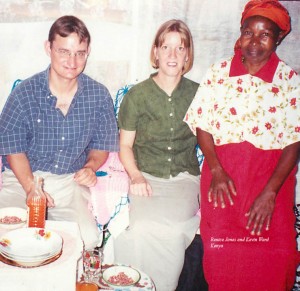 And my story? Tired of corporate America and a more than a little concerned about being in the IT industry with Y2K looming, I decided to do something different and join the Peace Corps in 1999 and was part of the newly-developed sector that focused on computer training, including training a teenage mothers’ group basic computer skills in Kenya. My focus rapidly shifted to include supporting the artisans in the handicraft sector by creating a web site with another volunteer and my now-husband, Kevin Ward, and selling their products internationally. When we moved to the US and started Global Crafts, we had no idea we’d be working in fair trade with so many countries and artisans but we felt strongly that we had to make the online market available to as many as we could. In 2008, my PC counterpart, Philomena Mushaka who still works with the teenage mothers who make recycled jewelry that we carry today, made her first trip to the US to take part in the Fair Trade Futures conference in Boston. I was thrilled for her to see what we had become as a result of selling dolls and jewelry the teenage mothers made and how the Fair Trade movement had grown.
And my story? Tired of corporate America and a more than a little concerned about being in the IT industry with Y2K looming, I decided to do something different and join the Peace Corps in 1999 and was part of the newly-developed sector that focused on computer training, including training a teenage mothers’ group basic computer skills in Kenya. My focus rapidly shifted to include supporting the artisans in the handicraft sector by creating a web site with another volunteer and my now-husband, Kevin Ward, and selling their products internationally. When we moved to the US and started Global Crafts, we had no idea we’d be working in fair trade with so many countries and artisans but we felt strongly that we had to make the online market available to as many as we could. In 2008, my PC counterpart, Philomena Mushaka who still works with the teenage mothers who make recycled jewelry that we carry today, made her first trip to the US to take part in the Fair Trade Futures conference in Boston. I was thrilled for her to see what we had become as a result of selling dolls and jewelry the teenage mothers made and how the Fair Trade movement had grown.
While serving in countries around the world, we all saw firsthand that traditional aid did little to break the circle of poverty in our communities. Fair Trade as a term may not have even existed when we were volunteers or if it did, we may not have known about it. But there is no doubt that any of us would have considered doing business in any other way, making the path from Peace Corps service to Fair Trade one that made perfect sense. We all know the Peace Corps slogan, “The toughest job you’ll ever love.” In some cases it helps people find themselves, others find a calling, still others find a career. But the desire to continue to play a part in helping those less fortunate by providing a sustainable path out of poverty is that itch that RPCVs need to scratch and working in Fair Trade is the near-perfect backscratcher.
When I reached out to this group, I was thrilled that so many of you were willing to tell your stories and share your photos and I don’t want to let the content I didn’t have room for to be for my eyes only. I’m working on a plan for what to do with this and will reach out to you before doing anything with it. And if there are others of you in the Fair Trade Federation who would like to tell your PCV story for posterity, by all means send it my way.